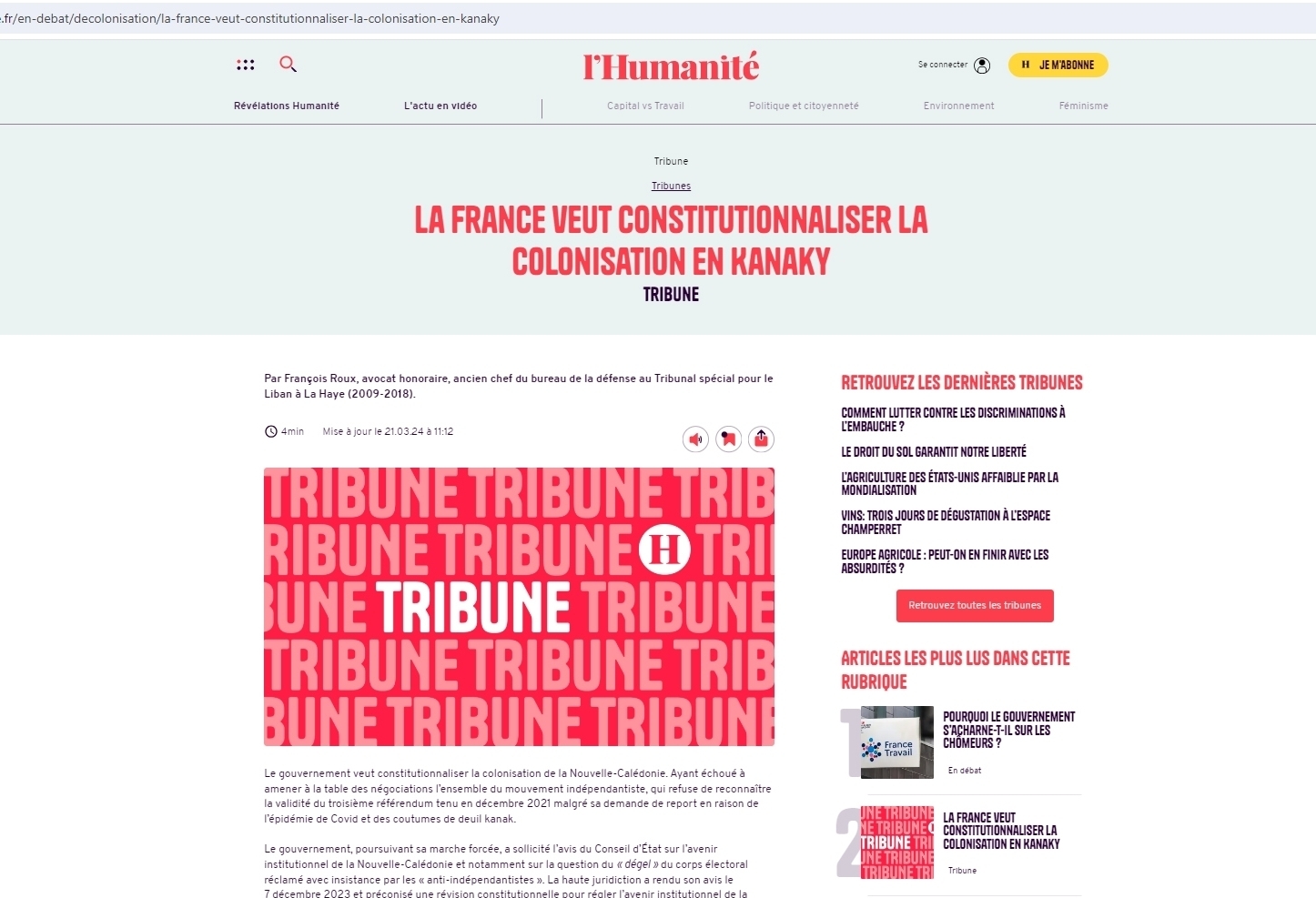



Lawyer: France wants to constitutionalize the colonization of New Caledonia

Baku, March 22, AZERTAC
On March 21, François Roux, an honorary lawyer and former director of the Defense Office at the Special Tribunal for Lebanon in The Hague in 2009-2018, appealed to French MPs through the French newspaper L'Humanité.
The French lawyer noted that the government wanted to constitutionalize the colonization of New Caledonia. He said that the government could not bring all the participants of the independence movement, who refused to recognize the validity of the third referendum held in December 2021, to the negotiation table despite their request to postpone it due to the COVID pandemic and the funeral ceremonies of the Kanak people.
It was emphasized that the government, continuing its forceful steps, requested the opinion of the French Council of State regarding the institutional future of New Caledonia, especially the increase in the number of those who have the right to vote in the elections. The supreme body issued its opinion on December 7, 2023, recommending a constitutional revision to regulate New Caledonia's institutional future, changing the electoral rules established by the 1998 Noumea Agreement.
“Albert Camus used to say that ‘not calling processes by their names means bringing additional misery to the world.’ So let's make this clear: The issue of New Caledonia is about the right of colonized peoples to self-determination and in no way about the decision of the French on the issue of the equality of their citizens under electoral law. In 1960, the General Assembly of the United Nations adopted Resolution No. 1514, which contained the Declaration on Granting Independence to Colonized Countries and Peoples.
Since 1986, New Caledonia has been on the list of territories to be decolonized. A special committee of the United Nations on decolonization monitors the situation every year and makes recommendations regarding France. Despite several attempts by those against independence, they failed to remove New Caledonia from the list of territories to be decolonized.
Therefore, how can France, one of the drafters of the United Nations Charter of 1945 and later of the 1948 Universal Declaration of Human Rights, as well as a permanent member of the Security Council, try to shy away from its obligations under the terms of the Charter regarding the decolonization of territories?
We can all agree that things are not easy in New Caledonia due to the long-standing settlement policy. In the preamble to the Noumea Agreement of 1998, violence against the Kanak people, the indigenous people, was officially acknowledged for the first time.
So how does the government of the ruling power after 25 years imagine that the future of New Caledonia will be resolved under French law by increasing the number of people with the right to vote, resulting in a minority of Kanaks?
If an opinion is required, it should certainly not be one of a French court, but the only relevant international body established by the Charter of the United Nations – the International Court of Justice (ICJ) headquartered in The Hague.
The court has the authority to issue a legal opinion after conflicting debate between the parties concerned. This has manifested itself in the issues of climate change by the Shagos Islands between Mauritius and the United Kingdom, the wall being built by Israel or Vanuatu, the former Franco-British condominium.”
Appealing to parliamentarians, the veteran lawyer said: “You will honor your mandate by refusing to vote on any changes to the Constitution regarding New Caledonia and by allowing the French government to refer the matter to the International Court of Justice through the UN General Assembly as a ‘managing power’. The International Court of Justice will allow one interested party to present its arguments. Building peace through law is the motto of the Peace Palace where the International Court of Justice is located.”
Charles Michel welcomes agreement between Armenia and Azerbaijan
Swedish Foreign Minister welcomes agreement on border delimitation between Armenia and Azerbaijan